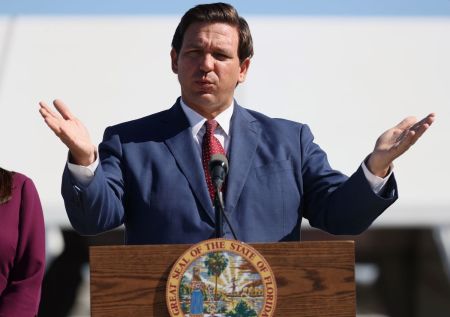Florida will face God’s judgement over voting bill, black pastors say

Calling it a shameless example of voter suppression rooted in systemic racism, a coalition of black pastors in Florida has blasted a proposed bill, which would, among other things, eliminate ballot drop boxes and require proof of identification to vote by mail.
Florida Senate Bill 90, sponsored by Republican Sen. Dennis Baxley, would also prohibit anyone other than an immediate family member from returning another person’s absentee ballot and make absentee-ballot requests valid for only one election cycle.
Under current rules, one request allows voters to receive mail-in ballots for two cycles.
“Senator Baxley, you're hearing us, but you're not listening to us. But you will listen to God," Rev. Reginald Gundy, the coalition’s chairman, declared on the steps of Florida's Old Capitol in a press conference last Friday, according to Spectrum News 13.
"Because you say you're a man of faith, and when you get to that point where you've got to stand up and be accountable for the decisions that you made, you'll have to answer for putting a bill forward that suppressed voters in this state."
Baxley argued that tightening the mail-in voting process will make Florida's elections more secure even though both state and local election officials have found no evidence that the integrity of the 2020 election was compromised.
"Some people say 'Why?' and I say, ‘why not? Let's try it,’" he said during a recent committee hearing on the bill. "We can always do it different next week or next month or next year, but why not try this? It may actually invigorate participation instead of it being so uninvolved."
The pastors prayed for God to "touch" the lawmaker's heart and "stare up his soul" so that he "would pull this bill back."
The pastors’ objections come as a new Rasmussen Reports survey suggests that 75% of likely U.S. voters believe voters should be required to show photo identification before they can vote. In comparison, 21% say they oppose such a requirement.
Florida Gov. Ron DeSantis, a Republican who won by a narrow margin in 2018 and is expected to seek re-election in 2022, is pushing SB 90 as a priority.
He has called for limits on mail-in ballots as well as the discontinuation of drop boxes.
“I didn’t even know that this had been in the law,” DeSantis said earlier this month when asked about the proposal to ban vote-by-mail drop boxes, according to Tampa Bay Times. “And when I found that, I said, ‘Well, that’s a problem.’”
Florida SB 90 is among several new state bills identified by FiveThirtyEight as “likely to become law in the coming weeks or months.”
Critics of the bills claim they are efforts to restrict voting in the wake of the historic voter participation in the 2020 election. If enacted, those bills will join new laws recently passed in six states, including Georgia’s controversial SB 202 signed into law last Thursday.
Among its many provisions, Georgia’s SB 202 will require absentee voters to prove their identity. Anyone who is not a poll worker is prohibited from handing out food and water to voters waiting in line within 150 feet of the polling location. The state board of elections can request an independent performance review of their appointed elections board or election superintendents. The state board can also suspend a multi-person elections board or probate judge and replace them with a single individual for at least nine months, according to Georgia Public Broadcasting.
The law also requires that all counties have at least one drop box but limits the number of boxes to one per 100,000 active voters, or one for every early voting location. The legislation moves the drop boxes inside the locations instead of placing them outside and makes boxes accessible only during early voting days and hours.
The new law standardizes early-voting hours and gives voters less time to request absentee ballots. Ballots can only be requested no more than 11 weeks before an election. The law also bars the mailing of unsolicited absentee-ballot applications and allows unlimited voter challenges.
As The Wall Street Journal editorial board points out, the Georgia bill allows for more early voting flexibility than some other states. There are areas where the law expands early voting. The law also permits no-excuse absentee voting, meaning that Georgia voters can request an absentee ballot for no reason. The newspaper reports that over a dozen states require mail voters to give a valid excuse.
The Brennan Center for Justice, a voting rights advocacy group, said 253 bills to "restrict voting access" had been introduced in 43 state legislatures as of Feb. 19. Since then, FiveEightThirty has tracked at least 53 additional bills. And of these 306 bills, 89% were sponsored entirely or primarily by Republicans, bill-tracking service LegiScan noted.
“The politicians introducing new voter restrictions are clearly folks who are looking at changing demographics and changing political winds, and trying to manipulate the rules of the game so that they have some job security,” Myrna Pérez, the director of the Brennan Center’s Voting Rights and Elections Program, told FiveEightThirty. “Rather than competing for voters, they are trying to fence some voters out and make it harder for them to vote.”
While nearly half of the bills have focused on restricting absentee voting, most of them, according to the publication, are not going to pass. Some 29% of them were introduced in Democratic-controlled legislative chambers, rendering them dead on arrival. Some are so extreme they don’t have Republican support, the website reported.





















